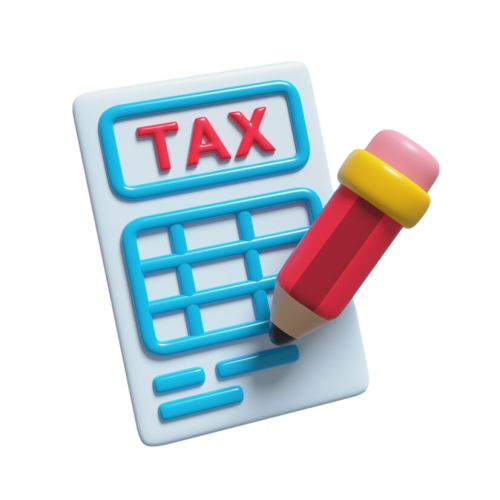Smarter Tax Planning for Every Stage of Your Life
Tax planning is the key to keeping more of what you earn, both now and in the future. At Fiscal Integrity Group, we go beyond tax prep by building tailored strategies to lower your tax bill, maximize deductions and credits, and help you make smart financial decisions all year long. Whether you’re an individual or a business owner, we factor in your income, investments, retirement goals, and changing tax laws to create the plan that works best for you. With FIG’s proactive tax planning, you stay ahead of costly surprises, take advantage of new opportunities, and enjoy true financial peace of mind.
Why Choose Fiscal Integrity Group For Your Tax Services?
- Experience: Over 20 years of experience in tax planning and consulting.
- Proactive Approach: Continuous communication and support throughout the year.
- Comprehensive Services: From individual tax planning to complex business tax strategies.
- Local Knowledge: Ability to advise and represent on tax laws and regulations in all 50 states.
Year-Round Tax Planning: A Step-by-Step Guide for Individuals
Most people think about taxes only when April approaches, but successful tax management happens throughout the entire year. This comprehensive guide will teach you how to implement proactive tax planning strategies that can significantly reduce your tax burden, maximize your deductions and credits, and eliminate the stress of last-minute tax preparation.
Understanding the Fundamentals
What is Year-Round Tax Planning?
Year-round tax planning is the practice of making tax-conscious financial decisions throughout the entire year, rather than scrambling to minimize taxes only during filing season. This proactive approach involves continuously monitoring your income, expenses, and financial changes to optimize your tax situation.
Why Traditional Tax Planning Falls Short?
Waiting until tax season to address your taxes means missing numerous opportunities to:
- Adjust withholdings after life changes
- Time income and expenses strategically
- Maximize deductions through proper record-keeping
- Take advantage of tax-favored accounts
- Plan for major financial decisions with tax implications
The Core Components of Effective Tax Planning
1. Organize Your Tax Records System
Create a systematic approach to tracking tax-related information throughout the year:
Monthly Tasks:
- Collect and file receipts for deductible expenses
- Track charitable contributions and donations
- Monitor investment gains and losses
- Update expense tracking spreadsheets or software
Quarterly Tasks:
- Review withholdings and estimated tax payments
- Assess progress toward annual contribution limits
- Evaluate investment portfolio for tax-loss harvesting opportunities
- Update projections based on actual income and expenses
2. Master Income and Expense Timing
Understanding when to recognize income and claim expenses can significantly impact your tax liability:
Income Acceleration Strategies:
- In lower-income years, consider Roth IRA conversions
- Accelerate bonus payments or investment gains when in lower tax brackets
- Realize capital gains during years with lower overall income
Income Deferral Techniques:
- Maximize contributions to tax-deferred retirement accounts
- Consider deferred compensation plans if available
- Time the sale of investments to spread gains over multiple years
Expense Timing:
- "Bunch" deductible expenses into alternating years to exceed the standard deduction
- Time elective medical procedures to maximize medical expense deductions
- Accelerate charitable giving in high-income years
3. Maximize Tax-Advantaged Accounts
Learn to use these powerful tools effectively:
Retirement Accounts:
- Traditional 401(k) and IRA contributions reduce current taxable income
- Roth contributions provide tax-free growth and withdrawals in retirement
- Catch-up contributions for those 50 and older increase savings potential
Health Savings Accounts (HSAs):
- Triple tax advantage: deductible contributions, tax-free growth, tax-free qualified withdrawals
- Available with high-deductible health plans
- Can serve as additional retirement savings vehicle
529 Education Plans:
- State tax deductions for contributions in many states
- Tax-free growth and withdrawals for qualified education expenses
- Can be used for K-12 tuition up to annual limits
4. Understand Tax Bracket Management
Strategic tax bracket management helps minimize your overall tax burden:
Key Concepts:
- Know your marginal tax rate and how additional income affects it
- Understand the difference between marginal and effective tax rates
- Learn about income thresholds that trigger additional taxes or phase-out benefits
Implementation Strategies:
- Spread large income events over multiple years when possible
- Consider timing of retirement account distributions
- Balance current-year tax savings with future tax implications
Seasonal Tax Planning Calendar
January - March: Foundation Setting
- Review prior year tax return for planning opportunities
- Adjust withholdings based on life changes
- Make prior-year IRA contributions before the deadline
- Organize tax records and establish systems for the new year
April - June: Mid-Year Assessment
- File tax return and analyze results
- Calculate first quarter estimated tax payments
- Review investment portfolio for rebalancing opportunities
- Assess progress toward annual savings goals
July - September: Strategy Refinement
- Update tax projections based on actual year-to-date performance
- Consider Roth IRA conversions if in lower tax bracket
- Plan for potential year-end tax moves
- Review beneficiary designations and estate planning needs
October - December: Implementation Phase
- Execute year-end tax strategies
- Maximize retirement account contributions
- Harvest investment losses to offset gains
- Make charitable contributions and pay deductible expenses
Advanced Planning Strategies
Charitable Giving Optimization
- Use donor-advised funds to bunch charitable deductions
- Consider donating appreciated securities instead of cash
- Explore qualified charitable distributions from IRAs for those over 70½
Investment Tax Management
- Understand the difference between short-term and long-term capital gains rates
- Use tax-loss harvesting to offset gains with losses
- Consider municipal bonds for high-income taxpayers in high-tax states
Life Event Planning
Major life changes create tax planning opportunities and challenges:
Marriage or Divorce:
- Understand filing status implications
- Plan for changes in tax brackets and deduction eligibility
- Consider timing of the event for optimal tax treatment
Having Children:
- Claim child tax credits and dependent exemptions
- Utilize dependent care FSAs for childcare expenses
- Plan education savings through 529 plans
Home Ownership:
- Maximize mortgage interest and property tax deductions
- Understand home office deduction rules
- Plan for capital gains exclusion when selling
Working with Tax Professionals
When to Seek Professional Help
Consider professional guidance if you have:
- Multiple income sources or complex investments
- Self-employment or rental property income
- Significant life changes or major transactions
- Multi-state tax obligations
- Estate planning needs
Maximizing Professional Relationships
- Schedule regular check-ins beyond tax season
- Provide timely information about financial changes
- Ask questions about tax implications of major decisions
- Request projections and planning scenarios
Common Mistakes to Avoid
Record-Keeping Errors
- Failing to track deductible expenses throughout the year
- Missing receipts and documentation for claimed deductions
- Not separating business and personal expenses
Timing Mistakes
- Making financial decisions without considering tax implications
- Missing deadlines for contributions and elections
- Failing to adjust withholdings after life changes
Planning Oversights
- Focusing only on current-year tax savings
- Ignoring state tax implications
- Not coordinating tax planning with overall financial goals
Getting Started: Your First Steps
1. Assess Your Current Situation
- Review last year's tax return to identify planning opportunities
- Calculate your effective and marginal tax rates
- Identify areas where you may have missed deductions or credits
Establish Systems
- Set up a record-keeping system for receipts and tax documents
- Create calendar reminders for quarterly planning reviews
- Open tax-advantaged accounts if you don't already have them
2. Set Goals
- Determine annual contribution targets for retirement accounts
- Establish charitable giving plans
- Create withholding adjustment schedule based on income changes
3. Build Your Team
- Find qualified tax professionals if needed
- Coordinate with financial advisors and other professionals
- Establish regular communication schedules
Measuring Success
Track your progress by monitoring:
- Year-over-year changes in effective tax rates
- Success in maximizing deductions and credits
- Achievement of retirement and savings goals
- Reduction in tax-season stress and preparation time
Conclusion
Year-round tax planning transforms taxes from an annual burden into a strategic tool for wealth building and financial optimization. By implementing the strategies outlined in this guide, maintaining organized records, and working with qualified professionals when needed, you can significantly reduce your tax liability while achieving your broader financial goals.
Remember, effective tax planning is not about complex strategies or aggressive positions—it's about consistent application of proven techniques throughout the year. Start with the basics, build good habits, and gradually incorporate more advanced strategies as your situation becomes more complex.
At Fiscal Integrity Group, we're committed to helping individuals master year-round tax planning. Contact us to discuss how these strategies can be tailored to your unique situation and financial objectives.
Tax Planning Services
F.I.G understand that effective tax planning is essential to securing your financial future, that's why our proactive approach is designed to not only minimize your tax bill but also to help you take advantage of every opportunity to save and grow your wealth.
Whether you’re an individual looking to streamline your personal tax strategy, a business owner seeking comprehensive financial advice, or planning for your family’s estate, we offer tailored solutions that go far beyond the standard tax preparation process.
Ready to file your business taxes? Don’t worry! Fiscal Integrity Group can help you file your taxes and optimize your tax savings. Contact us! →
Tax Planning and Tax Advisory Services
Tax Planning
Tax Planning involves creating a customized tax plan for you. We thoroughly review every entity involved and apply strategies to optimize your tax situation. This process is essential for identifying opportunities to save on taxes.
Tax Advisory
Tax planning alone is not enough. After developing your tax plan, the next step is implementation. Our tax advisory services help you decide which strategies to implement and guide you through the process.
Business Planning
Our Business Planning services are designed to help businesses navigate complex financial landscapes with confidence. We provide tailored strategies that prioritize fiscal responsibility and long-term growth.
Estate Tax Planning
Our Estate Tax Planning services are designed to help businesses navigate complex financial landscapes with confidence. We provide tailored strategies that prioritize fiscal responsibility and long-term growth.
Who We Serve
Built on integrity and expertise, our firm delivers exceptional personalized service that goes beyond standard accounting practices.
Small Businesses
Mid-Sized & Enterprise Businesses
Large corporations
Knowledgeable Tax Consultants Dedicated to Your Success
F.I.G experienced tax consultants take the time to understand your unique situation and apply their extensive knowledge of the evolving tax landscape to help you make informed business and personal decisions. We are committed to providing you with the best possible tax planning services, which will allow you to make the best financial decisions for yourself.
Book A Free Consultation


